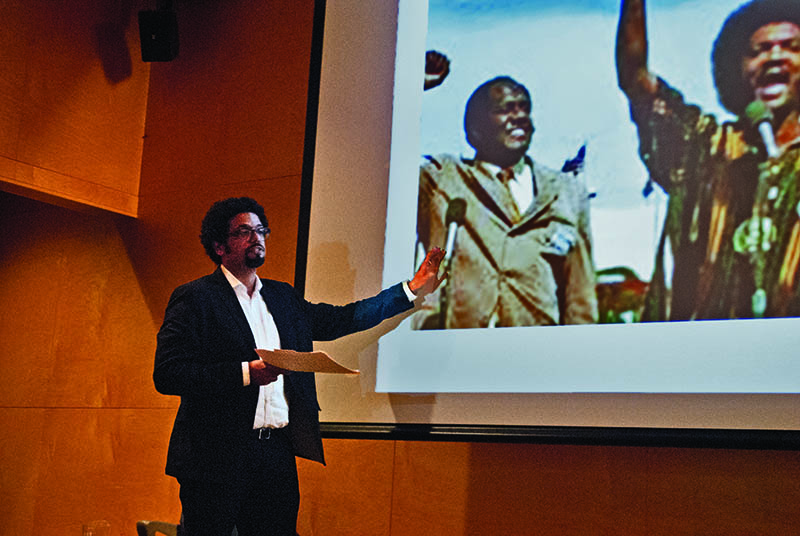Lecture Highlights Cultural, Racial Roots of Baseball
Frank Guridy, professor of History at Columbia University, discusses the importance of stadiums in baseball’s history in the United States. He and Adrian Burgos Jr., professor of History at the University of Illinois at Urbana-Champaign, presented their research on Latinx players in American baseball in Hallock Auditorium on Wednesday, Oct. 28.
October 30, 2015
Many different Oberlin communities came together in Hallock auditorium on Wednesday night to hear Professors Adrian Burgos, Jr. of the University of Illinois, Urbana-Champaign and Frank Guridy of Columbia University discuss the cultural and racial significance of baseball’s history in the United States.
Guridy specifically focused on his research into the significance of stadiums in baseball’s cultural history, whereas Burgos examined the legacy of Roberto Clemente, right fielder for the Pittsburgh Pirates. The talks were part of a three-day event organized by College senior Dyaami D’Orazio.
“This is my last chance to unite the different communities I have been a part of at Oberlin,” D’Orazio said while introducing the lecture.
D’Orazio, a former member of the Yeowomen’s varsity field hockey team, named student-athletes, the Latinx community and Bonner Scholars as a few of the targeted Oberlin communities she wanted to bring into dialogue with one another.
The event, titled “Sports Culture: A History of Color Lines, Stadiums, and Baseball,” was part of Latinx eritage Month. It focused on illuminating not only the importance of Latinx cultural ties to baseball in the United States, but also the erasure of these identities and the delegitimization of the contributions of Latinx players and fans to baseball’s development.
Guridy, author of Forging Diaspora: Afro-Cubans and African Americans in a World of Empire and Jim Crow, said he appreciated being able to share his research with the eclectic group of Oberlin students sitting before him.
“It’s a rare academic opportunity to address these diverse communities,” he said.
Guridy shared a number of anecdotes describing how Black and Latinx Bronx residents sought to take ownership of the original Yankee Stadium, originally a white-dominated space.
He also highlighted the franchise’s response to the changing demographics of the Bronx in the mid- to late-20th century, namely their fear that the growing Black and Latinx populations would “scare away” their white fans.
One anecdote came in the form of a video clip of the Fania All-Stars, a music group combining musicians on the leading salsa record label Fania Records, playing at Yankee stadium and inspiring their fans to the point that they mobbed and eventually climbed onto the stage.
Burgos focused on Roberto Clemente’s legacy as the first Latin American and Caribbean player to be inducted into the National Baseball Hall of Fame in 1973, an honor that followed only after his tragic death in a plane crash on his way to deliver aid to earthquake victims in Nicaragua.
He discussed how Latin American baseball players were rendered invisible by the media despite their significance in American baseball and the sport’s significance to their own culture. Clemente is a prime example, as he was not noticed until his death created a widespread feeling of guilt among baseball reporters who silenced and delegitimized him.
“Latinos are invisibly present in the history of baseball,” Burgos said. “They’re rendered invisible even as they’re our heroes.”
He also underlined the ways in which the press delegitimized Latin American baseball players by phonetically recording their interviews to emphasize their accents.
As Burgos said, “There was an emphasis on how they speak versus what they were saying. They were stripping [their voices] of their power to communicate, emphasizing their difference.”
Following the presentations, D’Orazio lamented the dark, exclusionary nature of sports that Guridy and Burgos illuminated. “I think of sports as a unifier,” she said, “but then you see all these things that show that that isn’t true.”
Guridy assured the audience that there was still much to be optimistic about regarding the unifying capabilities of sports, however. “I think that element is still there, as much as we talk about exclusion,” he said.
Altogether, the event consisted of three parts: a dinner discussion with POC students and the visiting professors on Wednesday, followed by presentations by Burgos and Guridy and concluding with a lunch with student-athletes at the Knowlton Athletic Complex on Thursday.
At the athlete lunch, Guridy and Burgos both emphasized the positive force sports participation can create, despite the grave issues they had both shared the night before.
“There is something about the sporting life that enables you to create knowledge,” Guridy said. “The actual practice of it is a powerful thing that hasn’t even been harnessed.”





















